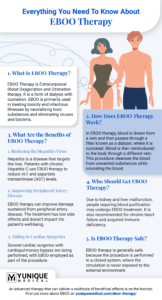Revitalizing Cells: Unleashing the Power of Blood Oxygenation and Ozonation Therapy
In the realm of innovative medical treatments, one approach has been gaining increasing attention for its potential to revitalize cells and enhance overall health. The process, known as extracorporeal blood oxygenation and ozonation therapy, taps into the power of oxygen and ozone to support the body's natural healing mechanisms. By infusing the blood with a blend of oxygen and ozone outside the body before reintroducing it, this therapy aims to optimize the blood's capacity to carry vital nutrients and promote cellular regeneration.
This technique holds the promise of numerous benefits, including improved circulation, enhanced immune function, and heightened detoxification. By boosting the blood's oxygen levels and introducing ozone, which is believed to have antimicrobial properties, extracorporeal blood oxygenation and ozonation therapy offers a holistic approach to wellness that targets multiple aspects of health. eboo ozone delves deeper into the science behind this therapy and explores the potential impact it can have on revitalizing cells and promoting well-being.
Applications in Medicine
In the field of medicine, extracorporeal blood oxygenation therapy has shown promising results in conditions such as acute respiratory distress syndrome (ARDS) and severe pneumonia. Patients with these critical respiratory illnesses often struggle to maintain adequate oxygen levels in their blood, leading to severe complications. By using extracorporeal oxygenation, medical professionals can provide vital support to these patients' respiratory systems and improve oxygenation levels swiftly.
Moreover, extracorporeal ozonation therapy has been utilized in the treatment of chronic infections and autoimmune diseases. Ozone, when introduced into the bloodstream, has been found to have potent antimicrobial properties, targeting pathogens and bolstering the immune response against them. This innovative therapy holds potential in managing conditions where conventional treatments may have shown limited efficacy, offering a novel approach to addressing challenging health issues.
Furthermore, the combination of blood oxygenation and ozonation therapy can offer a comprehensive approach to enhancing overall cellular function and promoting healing within the body. By synergistically leveraging the benefits of increased oxygen levels and ozone's therapeutic effects, this integrated treatment modality has the potential to address a wide range of health conditions, offering new avenues for personalized and effective medical care.
Benefits and Risks
One key benefit of extracorporeal blood oxygenation therapy is the potential to improve oxygen delivery to all tissues in the body, enhancing cellular function and promoting overall health. By increasing the oxygenation of the blood outside of the body through this therapy, it allows for a more efficient uptake of oxygen by red blood cells, which can have positive effects on energy levels, cognitive function, and healing processes.
Another advantage of extracorporeal ozonation therapy is its ability to stimulate the immune system and improve the body's ability to fight off infections and diseases. Ozonation therapy has been shown to have antimicrobial properties, helping to combat pathogens in the blood and boost the overall immune response. This can be particularly beneficial for individuals with compromised immune systems or chronic infections.
While there are potential benefits to extracorporeal blood oxygenation and ozonation therapy, it is important to consider the possible risks and side effects. Like any medical treatment, there may be associated risks such as allergic reactions, blood clotting issues, or changes in blood pressure. It is essential for individuals considering this therapy to consult with healthcare professionals to fully understand the potential risks and benefits based on their specific health conditions.
Future Perspectives

In the coming years, the field of extracorporeal blood oxygenation and ozonation therapy is poised to make significant advancements. Researchers are exploring innovative ways to enhance the effectiveness of this therapy, potentially unlocking even greater health benefits for patients.
One exciting avenue of research involves the development of more compact and portable devices for administering extracorporeal blood oxygenation and ozonation therapy. This could revolutionize the accessibility of treatment, allowing patients to undergo therapy in a wider range of settings, including outpatient clinics and even in the comfort of their own homes.
Moreover, as our understanding of the intricate mechanisms behind blood oxygenation and ozonation continues to deepen, we may see personalized treatment approaches tailored to individual patient needs. By fine-tuning therapy based on specific health conditions and responses, the future of this field holds the promise of delivering highly targeted and impactful interventions.